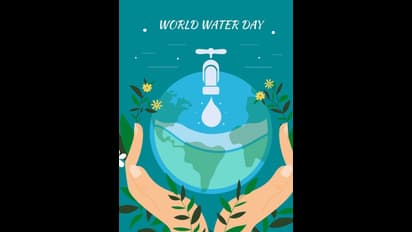World Water Day 2024: 7 effective methods of water conservation

Synopsis
Efficient irrigation, industry practices, home technologies, rainwater harvesting, landscaping, education, and policy advocacy are key to water conservation
Water, the elixir of life, is an indispensable resource essential for the sustenance of all living beings on Earth. As we commemorate World Water Day, it is imperative to recognize the crucial need for water conservation to ensure its availability for future generations. With growing populations and increasing demands on water resources, adopting efficient water conservation methods becomes paramount. Here are seven effective strategies to conserve water:
-
Implementing Efficient Irrigation Techniques: Agriculture accounts for a significant portion of global water consumption. By implementing advanced irrigation methods such as drip irrigation and precision watering systems, farmers can minimize water wastage while ensuring optimal crop growth. These techniques deliver water directly to the roots, reducing evaporation and runoff, thereby conserving significant amounts of water.
-
Promoting Water-Efficient Practices in Industries: Industrial processes consume substantial volumes of water, often leading to excessive waste. Encouraging industries to adopt water-efficient technologies and practices can drastically reduce water consumption. Reusing and recycling water within industrial facilities, implementing closed-loop systems, and conducting regular audits to identify and address areas of water inefficiency are essential steps in this regard.
-
Adopting Water-Saving Technologies in Homes: Residential water usage contributes significantly to overall consumption. Installing water-efficient appliances such as low-flow toilets, showerheads, and faucets can significantly reduce household water usage. Additionally, fixing leaks promptly and practicing responsible water usage habits, such as turning off taps when not in use and using dishwashers and washing machines with full loads, are simple yet effective ways to conserve water at home.
-
Harvesting Rainwater: Rainwater harvesting is a traditional practice that holds immense potential for water conservation. By capturing rainwater from rooftops and other surfaces, it can be stored and used for various purposes such as irrigation, landscape watering, and even indoor use with proper treatment. Rainwater harvesting not only conserves water but also helps mitigate stormwater runoff, reducing the risk of flooding and soil erosion.
-
Improving Water Management in Landscaping: Outdoor water usage, particularly for landscaping and gardening, can be optimized to conserve water. Utilizing drought-resistant plants, mulching to retain soil moisture, and employing smart irrigation controllers that adjust watering schedules based on weather conditions and soil moisture levels can significantly reduce water consumption in outdoor spaces. Furthermore, limiting the size of lawns and embracing xeriscaping principles can further conserve water resources.
-
Educating and Raising Awareness: Education and awareness play a crucial role in promoting water conservation practices. By fostering a culture of water consciousness through public awareness campaigns, educational programs, and community initiatives, individuals can be empowered to adopt water-saving behaviors in their daily lives. Understanding the value of water and the consequences of its wasteful use motivates people to take proactive steps towards conservation.
-
Advocating for Policy Changes and Water Governance: Effective water conservation requires robust policies and governance frameworks at local, national, and international levels. Governments and policymakers play a vital role in implementing regulations, incentives, and infrastructure investments that promote water efficiency and conservation across various sectors. By advocating for sustainable water management practices and supporting initiatives aimed at preserving water resources, stakeholders can contribute to long-term water security and resilience.
Water conservation is a collective responsibility that demands concerted efforts from individuals, communities, industries, and governments alike. By embracing innovative technologies, adopting water-efficient practices, promoting awareness, and advocating for policy changes, we can safeguard this precious resource for current and future generations. As we observe World Water Day, let us reaffirm our commitment to preserving the elixir of life and ensuring a sustainable water future for all.
Explore the latest Lifestyle News covering fashion, wellness, travel, Food and Recipes, and more. Stay updated with trending Health News, fitness tips, and expert insights to inspire your daily living. Discover personalized lifestyle trends that keep you stylish and informed. Download the Asianet News Official App from the Android Play Store and iPhone App Store for everything that adds value to your everyday life.